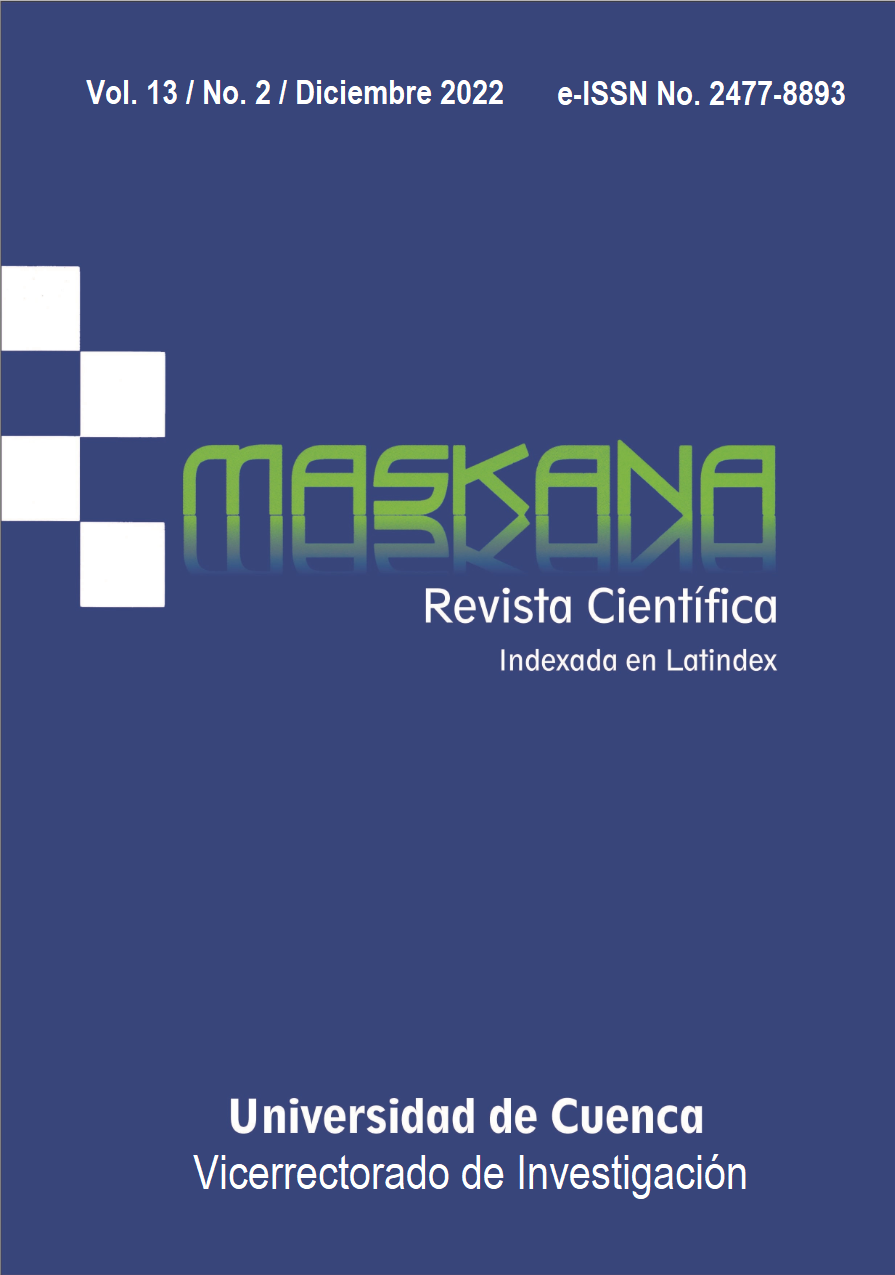El profesor efectivo de idioma inglés desde la perspectiva de estudiantes universitarios ecuatorianos
DOI:
https://doi.org/10.18537/mskn.13.02.01Palabras clave:
Enseñanza eficaz, docentes de inglés, características docentes, competencias docentes, eficacia docenteResumen
El estudio de la eficacia del docente de inglés como lengua extranjera ha sido un tema constante en la última década. Estas investigaciones se han centrado en las percepciones de los docentes y administradores de la educación. La mayoría de ellos se realizaron en países diferentes a América Latina. Esta investigación tuvo como objetivo crear un perfil de las percepciones de los estudiantes universitarios sobre las cualidades de un profesor efectivo de inglés como lengua extranjera. Para ello, se utilizó un enfoque cuantitativo que involucró la aplicación del cuestionario para profesores de inglés efectivos (EELT) de Roya Zamani & Ahangari (2016) a estudiantes de una universidad pública (N=324). Los hallazgos revelaron que los participantes valoran el conocimiento pedagógico como la dimensión más relevante de un docente universitario EFL eficaz por encima de las habilidades de organización y comunicación, las habilidades socioafectivas y el dominio del inglés. De acuerdo con la población estudiantil encuestada, las tres principales características relevantes de un docente universitario de inglés como lengua extranjera eficaz son ´ser flexible con las calificaciones´ (1.70), ‘tener buen sentido del humor´ (1.65) y ´evitar las críticas directas a los estudiantes cuando cometen errores´ (1.61). El artículo concluye esbozando algunas recomendaciones.
Descargas
Métricas
Citas
Allen, H. B. (1980). What it means to be a professional in TESOL. Teaching by principles: An interactive approach to language pedagogy (p. 429-490). Pearson Education, Inc.
Al-Maqtri, M., & Thabet, A. (2013). The qualities of the good English teacher as perceived by Saudi and Yemeni college students of English. Greener Journal of Educational Research, 3(2), 72-79. https://pdfs.semanticscholar.org/0e63/93e565440d4346bd9da960ce47102bad7cd4.pdf
Archanjo, R. (2016). Saberes sem fronteiras: Políticas para as migrações pós-modernas. DELTA, 32 (2), 515-541. https://doi.org/10.1590/0102-4450790718885409696
Brosh, H. (1996). Perceived characteristics of the effective language teacher. Foreign Language Annals, 29(2), 125-136. https://doi.org/10.1111/j.1944-9720.1996.tb02322.x
Brown, A. (2009). Students’ and teachers’ perceptions of effective foreign language teaching: A comparison of ideals. The Modern Language Journal, 93(1), 46-60. https://doi.org/10.1111/j.1540-4781.2009.00827.
Cambridge Academic Content Dictionary. (2021). Effectiveness. In Cambridge University Press (Ed.). https://dictionary.cambridge.org/dictionary/english/effectiveness
Darling-Hammond, L., & Youngs, P. (2002). Defining “Highly qualified teachers”: What does “scientifically-based research” actually tell us? Educational Researcher, 31, 13-25. http://dx.doi.org/10.3102/0013189X031009013
Demiroz, H., & Yesilyurt, S. (2015). Effective foreign language teaching: Perceptions of prospective English language teachers. Universal Journal of Educational Research, 3(11), 862-870. https://doi.org/10.13189/ujer.2015.031112
Entwistle, N., & Karagiannopoulou, E. (2014). Research into student learning and university teaching: Changing perspectives. (pp.75-98). doi:10.3366/edinburgh/9780748694549.003.0005
Febriyanti E. R. (2018). Investigating English department students’ perceptions about a good English language teacher. International Journal of Language Education, 2(2), 83-95. https://doi.org/10.26858/ijole.v2i2.6378
Galbán- Lozano, S. E., & Ortega-Barba, C. F. (2021). Cualidades y competencias del profesor universitario: La visión de los docentes. Revista Panamericana de Pedagogia, 31(2), 63-78. Available at https://revistas.up.edu.mx/RPP/article/view/2119/1799
Harmer, J. (2007). The practice of English language teaching. 4th ed., 448 pp. Harlow, England: Pearson Education.
Kane T. J., Rockoff J. E., Staiger D. O. (2008). What does certification tell us about teacher effectiveness? Evidence from New York City. Economics of Education Review, 27, 615–631.
Khaerati, K. (2016). The students’ perception on the characteristics of effective and ineffective English language teachers. Journal of English Language Teaching, 3(2), 1-10. https://doi.org/10.26858/eltww.v3i2.2260
Karagiannopoulou, E., Milienos, F., & Athanasopoulos, V. (2015). Associations between defense styles, approaches to learning, and achievement among university students. Frontiers in Education, 35(1), 26-52. DOI:10.3389/feduc.2018.00053
Karim, S. A. (2021). Bridging the gaps between teacher educators and student teachers’ perceptions about the attributes of effective teacher educators. Register Journal, 14(1), 1-24. https://doi.org/10.18326/rgt.v14i1.1-24
Karim, S. A., Rachmajantib, S., Suryatic, N., & Astutid, U. (2020). Uncovering student teachers’ perceptions regarding the characteristics of effective EFL teacher educators. International Journal of Innovation, Creativity, and Change, 13(4), 162-180. Available at https://ww.ijicc.net/images/vol_13/Iss_4/13420_Karim_2020_E_R.pdf
Lizasoain, A. (2021). Perfil del profesor de inglés en Chile: quién es y qué enseña. Educar, 57(1), 189-205. https://doi.org/10.5565/rev/educar.1150
Martínez, J. D. (2011). Perfil profesional idóneo del profesor de lengua extranjera: creencias del profesorado en formación. Revista Latinoamericana de Estudios Educativos, 41(1), 103-124. https://www.redalyc.org/pdf/270/27021144004.pdf
Mastrokoukou, S., Kaliris, A., Donche, V., Chauliac, M., Karagiannopoulou, E., Christodoulides, P. and Longobardi, C. (2022), Rediscovering teaching in university: a scoping review of teacher effectiveness in higher education. Frontiers in Education, 7, 1-16. file:///C:/Users/Usuario1/Downloads/feduc-07-861458.pdf
Matthews, B., & Ross, L. (2010). Research Methods. Pearson Longman, London.
Metruk, R. (2021). Male and female university students' perceptions of an effective EFL teacher. International Journal of Instruction, 14(2), 703-718. https://doi.org/10.29333/iji.2021.14239a
Metruk, R. (2020). Qualities of a good and effective teacher: Slovak EFL pre-service and in-service teachers’ perspectives. Journal of Language & Education, 6(3), 80-93. https://doi.org/10.17323/jle.2020.10593
Milienos, F. S., Rentzios, C., Catrysse, L., Gijbels, D., Mastrokoukou, S., Longobardi, C., et al. (2021). The contribution of learning and mental health variables in first-year students’ profiles. Frontiers in Psychology, 12:627118. doi: 10.3389/fpsyg.2021.627118
Molero López-Barajas, D., & Ruiz Carrascosa, J. (2005). La evaluación de la docencia universitaria. Dimensiones y variables más relevantes. Revista de Investigación Educativa, 23(1), 57-84. Recuperado a partir de https://revistas.um.es/rie/article/view/98341
Park, G., & Lee, H. (2006). The characteristics of effective English teachers as perceived by high school teachers and students in Korea. Asia Pacific Education Review,7, 236-248. https://doi.org/10.1007/BF03031547
Pennington, M. (1990). A professional development focus for the language teaching practicum. In: Richards, J. & Nunan, D. (Eds). Second language teacher education (p. 132-153). University Press.
RAE. (2021). Efectividad. In Real Academica Española. https://dle.rae.es/efectividad?m=form
Richardson, T., Huong Thao, D.T., Tam, N.T., & Anh, N. (2020). Assessment to learning: Improving the effectiveness of a teacher’s feedback to the learner through future actionable knowledge. Vietnam Journal of Educational Sciences, 1(2), 31-27. http://vjes.edu.vn/sites/default/files/bai_so_5_-_so_1_english_0.pdf
Roya Zamani, M. A., & Ahangari, S. (2016). Characteristics of an effective English language teacher (EELT) as perceived by learners of English. International Journal of Foreign Language Teaching & Research, 4(14), 70-85.
Shishavan, H. B., & Sadeghi, K. (2009). Characteristics of an effective English language teacher as perceived by Iranian teachers and learners of English. English Language Teaching, 2(4), 130-143. https://www.ccsenet.org/journal/index.php/elt/article/view/4462
Sotto, E. (2011). When Teaching Becomes Learning: A Theory and Practice of Teaching (2nd ed.). London, England: Continuum Education.
Sundari, H. (2016). The qualities of an effective English language teacher: University students' perception. Tesol Indonesia Conference. Research Gate. https://www.researchgate.net/publicati on/317951838
Tadesse, E. F., and Khalid, S. (2022). Are teachers and HE are on the same page? Calling for a research-teaching nexus among Ethiopian and Pakistani academics. Journal of Applied Research in Higher Education. doi: 10.1108/JARHE-09-2021-0348. [Epubahead of print].
Van der Lans, R., Van de Grift, W., & Van Veen, K. (2015). Developing a teacher evaluation instrument to provide formative feedback using student ratings of teaching acts. Educational Measurement, 34(3), 18-27. https://doi.org/10.1111/emip.12078
Wirantaka, A., & Wahyudianawati, P. A. (2021). Characteristics of effective English teacher for millennials. Journal of Foreign Language Teaching and Learning, 6(2), 185-206. https://doi.org/10.18.196/ftl.v6i2.11549
Witcher, A. E., Onwuegbuzie, A. J., Collins, K. M. T., Filer, J. D., …, & Moore, C. (2003). Students’ perceptions of characteristics of effective college teachers. ERIC Document Reproduction Service, 5(3), 482-517. Available at https://journal.umy.ac.id/index.php/FTL/issue/view/786
Zhang, O., Watkins, D. (2007). Conceptions of a good tertiary EFL teacher in China. TESOL Quarterly, 41, 781-790.
Descargas
Publicado
Cómo citar
Número
Sección
Licencia
Derechos de autor 2022 Daysi Narváez-Cantos

Esta obra está bajo una licencia internacional Creative Commons Atribución 4.0.
Copyright © Autors. Creative Commons Attribution 4.0 License para cualquier artículo enviado a partir del 6 de junio de 2017. Para los manuscritos presentados anteriormente, se utilizó la licencia CC BY 3.0.
![]()
Usted es libre de:
 |
Compartir — compartir y redistribuir el material publicado en cualquier medio o formato. |
 |
Adaptar — combinar, transformar y construir sobre el material para cualquier propósito, incluso comercialmente. |
Bajo las siguientes condiciones:
 |
Atribución — Debe otorgar el crédito correspondiente, proporcionar un enlace a la licencia e indicar si se realizaron cambios. Puede hacerlo de cualquier manera razonable, pero de ninguna manera que sugiera que el licenciador lo respalda a usted o a su uso. |
| Sin restricciones adicionales: no puede aplicar términos legales o medidas tecnológicas que restrinjan legalmente a otros a hacer cualquier cosa que permita la licencia. |
Mayor información sobre este acuerdo de autoría y licencia, transferencia de derechos o solicitudes de reproducción, pueden ser consultados en este enlace.






